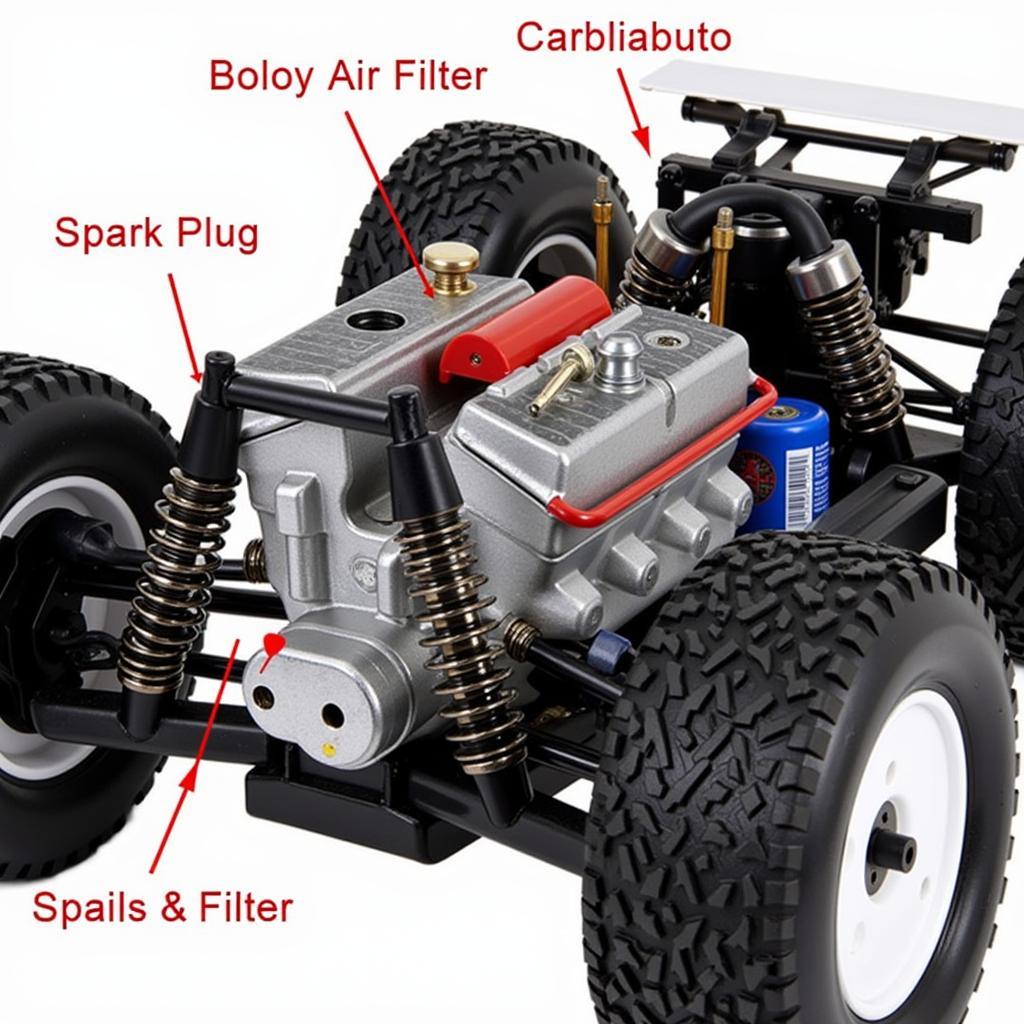Gas powered remote control cars offer a unique blend of speed, power, and exciting realism that sets them apart from their electric counterparts. From the roar of the engine to the smell of nitro fuel, these miniature machines deliver an adrenaline rush unlike any other. This guide will delve into the world of gas-powered RC cars, covering everything from choosing the right model to maintenance and troubleshooting.
Choosing Your First Gas Powered RC Car
Selecting your first gas-powered RC car can feel overwhelming with the sheer variety available. Consider your budget, experience level, and desired driving style. Ready-to-run (RTR) models are perfect for beginners, while kits offer greater customization for experienced hobbyists. Think about the scale and type of car you want – on-road, off-road, buggy, truggy, or monster truck. Each offers a distinct driving experience. Do you envision yourself tearing across a dirt track or conquering rocky terrain? Answering these questions will help you narrow down your choices.
If you’re just starting out, a 1/10 scale RTR is a great entry point. They’re generally easier to handle and maintain than larger scales, and offer a good balance of performance and affordability. As you gain experience, you can then explore larger scales and more advanced models. Remember to factor in the cost of fuel, batteries for the transmitter, and other accessories when budgeting for your RC car.
After your first electric car, you might want to upgrade to something more powerful and exciting. Gas-powered models provide a different driving experience, mimicking the real thing with their internal combustion engines.
Understanding the Mechanics of Gas Powered RC Cars
Gas-powered RC cars utilize a small two-stroke engine that runs on a mixture of nitro methane, methanol, and oil. These engines are remarkably powerful for their size, providing impressive acceleration and top speeds. Understanding the basic mechanics of these engines is crucial for proper maintenance and troubleshooting. Key components include the carburetor, which mixes the fuel and air, the spark plug, which ignites the mixture, and the exhaust system, which expels the burnt gases.
Regular maintenance, such as cleaning the air filter and checking the spark plug, is essential for keeping your gas-powered RC car running smoothly. Proper tuning of the carburetor is also crucial for optimal performance and fuel efficiency.
Maintenance and Troubleshooting for Gas Powered RC Cars
Like any engine, gas-powered RC car engines require regular maintenance to stay in top condition. This includes cleaning or replacing the air filter, checking and adjusting the spark plug, and cleaning the engine after each run. Learning to troubleshoot common problems, such as engine stalling or difficulty starting, can save you time and frustration. Having a good understanding of the mechanics and using a quality diagnostic scanner, like those reviewed on DiagXcar, can help you pinpoint and fix issues efficiently. Did you rent an electric car and enjoy the quiet operation? The experience with gas-powered RC cars is quite different, offering a more hands-on, mechanical engagement.
Common issues often stem from fuel mixture problems, a dirty air filter, or a faulty spark plug. Regularly inspecting and cleaning these components can prevent many problems from arising in the first place.
 Gas RC Car Engine Maintenance
Gas RC Car Engine Maintenance
Fueling Your Gas-Powered RC Car
Choosing the right fuel is essential for the performance and longevity of your gas-powered RC car’s engine. Nitro fuel is typically categorized by its nitro methane percentage, with higher percentages generally offering more power but also requiring more tuning and maintenance. Always follow the manufacturer’s recommendations for the appropriate fuel type for your specific engine. Proper storage and handling of nitro fuel are also important for safety and maintaining the fuel’s quality.
What’s the Fastest Gas Powered RC Car?
The quest for speed is a common theme among RC car enthusiasts. While pinpointing the absolute fastest gas-powered RC car is challenging due to various factors such as modifications and track conditions, certain models are renowned for their high-speed capabilities. These often include specially designed on-road cars and modified buggies capable of reaching impressive speeds. Looking for speed? Explore what’s the fastest car in the RC world.
Conclusion
Gas powered remote control cars offer a thrilling and rewarding hobby experience. By understanding the basics of choosing, maintaining, and troubleshooting these powerful machines, you can unlock their full potential and enjoy countless hours of high-octane fun. Remember, responsible ownership and operation are essential for both your enjoyment and the safety of others. From the thrill of the race to the satisfaction of tinkering with the engine, gas-powered RC cars provide a unique connection to the world of motorsports.
FAQ
- What type of fuel do gas-powered RC cars use? They use a mixture of nitro methane, methanol, and oil.
- Are gas-powered RC cars suitable for beginners? RTR models are a good starting point for beginners.
- How do I maintain my gas-powered RC car? Regular maintenance includes cleaning the air filter, checking the spark plug, and cleaning the engine.
- What are some common problems with gas-powered RC cars? Common problems include engine stalling, difficulty starting, and fuel mixture issues.
- Where can I find more information about gas-powered RC cars? Numerous online forums and communities dedicated to RC cars offer valuable information and support.
- What safety precautions should I take when using gas-powered RC cars? Always operate your RC car in a safe and controlled environment, away from people and obstacles.
- What’s the cost of owning a gas-powered RC car? The cost varies depending on the model, scale, and features, but consider the initial purchase price, fuel, batteries, and other accessories.
You can also check out our article on rented an electric car for a different perspective on the world of automobiles.
Need help with your car diagnostic scanner? Contact us via WhatsApp: +1(641)206-8880, Email: [email protected] or visit us at 276 Reock St, City of Orange, NJ 07050, United States. Our customer service team is available 24/7.


